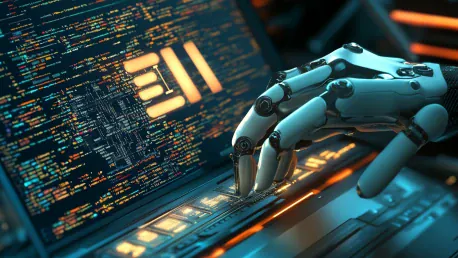AI-powered coding assistants have marked a significant evolution in software development, promising to enhance productivity and streamline the coding process. Tools like GitHub Copilot and Anthropic’s Claude Code are at the forefront, suggesting code completions, generating entire functions, debugging explanations, writing unit tests, and managing repetitive coding tasks. As developers adopt these tools, the implications for productivity and code quality necessitate a balanced examination.
Rising Popularity of AI Coding Assistants
Integration in Development Workflows
In recent years, AI coding tools such as GitHub Copilot, AWS’s CodeWhisperer, and Replit’s Ghostwriter have been integrated into developers’ workflows to expedite coding tasks. These tools adeptly handle boilerplate code, syntax, and repetitive tasks, significantly shortening the coding process and freeing up developers to focus on more complex and creative problems. The innovative functionality of these assistants lies in their ability to provide code suggestions and complete functions, which can exponentially increase development speed and efficiency.
For instance, AI assistants can automatically generate repetitive parts of a code or even suggest improvements in real-time, speeding up the workflow considerably. By reducing the time spent on mundane tasks, developers can dedicate more efforts to refining the core logic and enhancing the quality of the software product. This transformation in workflow has not only increased the pace of development but also amplified the creative scope for developers, enabling them to produce high-quality and innovative solutions in less time.
User Adoption Trends
The uptake of AI coding tools among developers is experiencing robust growth, reflecting a new era in software development. According to the 2024 Stack Overflow developer survey, 62% of developers are already leveraging AI tools, with an additional 14% set to begin integrating them into their daily routines. This trend signifies a broad acknowledgment of the efficiency gains provided by AI coding assistants, motivating more companies to embrace these tools within their development lifecycle.
Furthermore, many companies are championing these AI assistants to streamline their operations and enhance productivity. The survey results illustrate a progressive shift towards AI-enhanced development environments, evidencing a more widespread acceptance and trust in the capabilities of AI. Companies perceive AI assistants not as replacements for human developers but as supplementary tools that magnify human productivity and innovation. The adoption trends clearly underline the growing reliance on AI to transform and optimize the software development journey, highlighting its indispensable role in modern development practices.
Measurable Productivity Gains
Documented Improvements
Empirical studies underscore the significant productivity gains introduced by AI coding assistants. One extensive study involving over 4,800 developers from organizations like Microsoft, Accenture, and a Fortune 100 firm reported that GitHub Copilot enhances productivity by 26%. The data revealed that developers using Copilot completed 25% more tasks weekly, made 13.5% more code commits, and experienced a 38% increase in code compilation frequency, enabling faster development iterations. These improvements underscore the substantial impact of AI assistants in expediting the development process, showcasing a quantifiable boost in efficiency.
These documented productivity enhancements are pivotal in understanding how AI tools are reshaping the coding paradigm. By automating repetitive and time-consuming tasks, AI assistants allow developers to allocate more time towards solving complex problems and refining software quality. Furthermore, the frequency of code commits and compilations significantly affects the iterative development process, enabling teams to detect and resolve issues swiftly. Thus, the compelling evidence from these studies illustrates how AI coding assistants substantially elevate the productivity and effectiveness of development teams.
Varied Impact Based on Experience
The productivity gains attributed to AI coding assistants are not uniformly distributed among all developers. Studies demonstrate that less experienced developers reported productivity increases of 20-40%, whereas senior developers experienced more modest benefits. This disparity highlights the differing reliance levels on AI tools, with newer developers perhaps depending more heavily on AI for guidance and support in navigating complex coding challenges.
For less experienced developers, AI coding assistants serve as invaluable mentors, offering real-time suggestions, debugging aid, and function completions that significantly enhance their learning curve. Conversely, seasoned developers tend to use AI tools for augmenting efficiency rather than fundamental guidance, which explains the more subtle productivity gains in their case. The insights reveal that while AI coding assistants play a crucial role across the experience spectrum, they provide distinct levels of benefit tailored to the individual developer’s expertise. This nuanced impact stresses the importance of personalized approaches in integrating AI tools based on users’ experience levels to maximize productivity gains.
Real-World Usage and Feedback
Practical Benefits
AI coding assistants like GitHub Copilot have demonstrated considerable utility in daily development tasks, as echoed by industry professionals. Kristóf Dombi, Head of PaaS Development at Kinsta, particularly highlighted the effectiveness of Copilot in tasks such as translations, copywriting, and routine coding. These AI tools substantially alleviate the burden of mundane tasks, thereby allowing developers to concentrate on high-value and creative aspects of their work. The practical benefits extend beyond mere code automation; they include simplifying documentation processes, generating unit tests, and crafting commit messages, which collectively enhance overall workflow efficiency.
In practice, these tools seamlessly integrate into standard development environments, providing invaluable support without disrupting the established workflow. The capacity of AI coding assistants to streamline repetitive tasks has resulted in a marked reduction in time spent on these activities. This shift enables developers to channel their energy into innovation and quality improvements, which are critical for delivering superior software solutions. The positive feedback from the developer community underscores the transformative potential of AI coding assistants in everyday work scenarios, reinforcing their role as indispensable allies in the software development process.
Critical Perspective
Despite the demonstrated advantages, maintaining a critical perspective on AI coding assistants is vital. Instances where these tools might underperform on seemingly simple tasks highlight the importance of evaluating their performance on a case-by-case basis. AI coding assistants are not infallible and can sometimes produce outputs that require additional human intervention to correct or refine. This underscores the necessity for developers to approach AI-generated code with a scrutinizing eye, thoroughly verifying and validating the suggestions provided by these tools before integration into production environments.
Moreover, developers must remain vigilant about the potential pitfalls of over-reliance on AI, which can sometimes lead to complacency and reduced diligence in coding practices. By critically assessing AI outputs and integrating rigorous checks, developers can harness the full potential of these tools while mitigating risks. This balanced approach ensures that AI coding assistants act as a complement to, rather than a replacement for, human insight and expertise, thereby fostering a more robust and reliable development process. By maintaining this critical perspective, developers can effectively leverage AI tools to optimize productivity while safeguarding the quality and integrity of their code.
Cognitive Load and Developer Experience
Mixed Results on Cognitive Load
The impact of AI coding assistants on cognitive load has yielded mixed results, highlighting both the benefits and challenges associated with their use. A NeuroIS study investigating the cognitive load experienced by developers using ChatGPT for coding revealed that AI tools do not universally reduce cognitive load compared to traditional coding methods. One key factor contributing to this outcome is the mental effort required to effectively formulate prompts, interpret AI responses, and integrate those responses into existing codebases. While AI tools can offload memory-related tasks, the cognitive demands of understanding and validating AI-generated suggestions introduce new challenges.
These contrasting results emphasize the complexity of cognitive processes involved in using AI coding assistants. Developers must not only rely on AI for generating code but also engage critically with the outputs, ensuring accuracy and relevance to the current task. This dual cognitive load—relying on AI while validating its contributions—can sometimes offset the anticipated reduction in mental effort. Therefore, the mixed verdict on cognitive load underscores the need for balanced usage strategies that optimize the benefits of AI tools while managing the additional cognitive demands they introduce.
Balancing Load and Output
Effectively balancing the cognitive load and output of AI coding assistants is crucial for maximizing their utility in development environments. While AI tools are adept at offloading memory-intensive tasks, they simultaneously necessitate active human involvement in assessing and refining their outputs. This dynamic creates a critical interplay between reducing routine cognitive tasks and interpreting AI-generated code with accuracy and precision. Achieving an optimal balance requires developers to skillfully navigate this relationship, leveraging AI to streamline workflows while maintaining a vigilant and proactive approach to code validation.
The balance between cognitive load and output directly influences the overall effectiveness of AI coding assistants in real-world scenarios. Developers must adopt strategies that incorporate AI tools in a manner that enhances productivity without overwhelming mental resources. This involves continuous learning and adapting to the nuances of AI interactions, refining prompt strategies, and developing robust validation protocols. By fine-tuning the balance between cognitive load and output, development teams can harness the full potential of AI coding assistants to achieve superior productivity and high-quality code outputs, ultimately fostering a more efficient and effective development process.
Quality and Maintenance Concerns
Risks of Technical Debt
The integration of AI-generated code into development projects presents significant risks concerning code quality and maintainability, which can lead to the accumulation of technical debt. Quick fixes and non-idiomatic code generated by AI assistants often contribute to this phenomenon, as they may not adhere to best practices or optimize the overarching code structure. Over time, the reliance on AI-generated code can result in a codebase that is increasingly difficult to understand and maintain, posing long-term challenges for developers tasked with future updates and enhancements.
Technical debt manifests as code that requires substantial rework and optimization to meet quality standards. AI-generated code can exacerbate this issue by introducing segments that are functional yet suboptimal, requiring developers to invest additional effort into refining and aligning the code with established conventions. Addressing these risks necessitates a proactive approach, where developers rigorously review and refactor AI-generated contributions to ensure they meet quality benchmarks. By acknowledging and mitigating the risks of technical debt, development teams can better manage the integration of AI tools while preserving the maintainability and robustness of their codebases.
Importance of Oversight
The successful integration of AI coding assistants into development workflows hinges on the implementation of proper oversight mechanisms, including thorough code reviews and rigorous testing protocols. Treating AI-generated drafts with the same scrutiny as a junior developer’s work ensures that all code contributions meet quality standards and align with project requirements. This approach helps mitigate the risks of technical debt by identifying and addressing potential issues early in the development cycle, before they escalate into more significant problems.
Furthermore, continuous oversight promotes a culture of quality and accountability within development teams, encouraging critical evaluation of AI suggestions. Developers must remain vigilant in validating AI outputs, ensuring they comply with coding standards and project objectives. By incorporating best practices such as code reviews, pair programming, and automated testing, teams can effectively harness the productivity benefits of AI coding assistants while maintaining high-quality codebases. This balanced approach ensures that AI tools serve as valuable collaborators in the development process, contributing to sustainable and maintainable software solutions.
Best Practices for Effective Use
Treat AI Suggestions Critically
Emerging best practices for the effective use of AI coding assistants emphasize the importance of treating AI-generated suggestions with a critical eye. Rather than blindly accepting AI outputs, developers must evaluate and validate each suggestion thoroughly to ensure it aligns with project requirements and coding standards. This critical approach mirrors the review processes applied to human-generated code, reinforcing the necessity of human oversight and judgment in the development process.
In practice, treating AI suggestions critically involves adopting a mindset of continuous evaluation and refinement. Developers should view AI-generated code as a starting point, subject to rigorous scrutiny and modification before integration into the main codebase. This approach helps mitigate the risks associated with non-idiomatic or suboptimal code and ensures that all contributions are of high quality. By fostering a culture of critical evaluation, development teams can maximize the benefits of AI coding assistants while maintaining robust and reliable code outputs, ultimately enhancing the overall quality and sustainability of their software products.
Implementing Secure and Responsible AI
AI-powered coding assistants represent a notable advancement in the realm of software development, offering the potential to significantly boost productivity and simplify the coding process. Leading tools such as GitHub Copilot and Anthropic’s Claude Code are spearheading this transformation. These innovative assistants suggest code completions, create entire functions, provide debugging explanations, write unit tests, and handle repetitive coding tasks efficiently. The adoption of these tools by developers promises to have considerable effects on productivity and the overall quality of code. Therefore, a thorough and balanced evaluation of their impact is essential. While these tools offer substantial benefits, it is important to recognize the potential challenges and limitations they might introduce. The evolution of AI in coding necessitates a nuanced understanding and approach, ensuring that developers harness these tools effectively without compromising on the integrity and functionality of their code.









